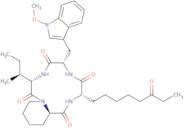
Apicidin
CAS : 183506-66-3
Ref. 3D-FA17952
| 1mg | À demander | ||
| 2mg | À demander | ||
| 5mg | À demander | ||
| 10mg | À demander | ||
| 25mg | À demander |
Informations sur le produit
- Cyclo[(2S)-2-amino-8-oxodecanoyl-1-methoxy-L-tryptophyl-L-isoleucyl-(2R)-2-piperidinecarbonyl]Cyclo(8-oxo-L-2-aminodecanoyl-1-metho xy-L-tryptophyl-L-isoleucyl-D-2-piperidinecarbonyl)Apicidin ia
- Cyclo-L-(2-Amino-8-Oxodeacanoyl)-L-(N-Methoxy-Tryptophan)-L-Isoleucyl-D-Pipecolinyl
- Cyclo-[L-(2-Amino-8-Oxodecanoyl)-L-(N-Methoxytryptophan)-L-Isoleucyl-D-Pipecolinyl
- Cyclo[(2S)-2-Amino-8-Oxodecanoyl-1-Methoxy-L-Tryptophyl-L-Isoleucyl-(2R)-2-Piperidinexcarbonyl]
- Apicidin, Fusarium Species
- (3S,6S,9S,15aR)-6-[(1-methoxy-1H-indol-3-yl)methyl]-9-[(1S)-1-methylpropyl]-3-(6-oxooctyl)octahydro-2H-pyrido[1,2-a][1,4,7,10]tetraazacyclododecine-1,4,7,10(3H,12H)-tetrone
Apicidin is a cyclic peptide that is structurally similar to the natural antibiotic apigenin. It has been shown to inhibit cancer cell proliferation and induce apoptosis in vitro. Apicidin has also been shown to be effective against squamous carcinoma, hl-60 cells, and mitochondrial membrane potential, as well as other types of cancer cells in vivo. Apicidin binds to the mitochondrial membrane and inhibits ATP synthesis by blocking the electron transport chain. This causes a decrease in cellular energy production and an increase in intracellular oxidative stress which leads to apoptosis.
Propriétés chimiques
Question d’ordre technique sur : 3D-FA17952 Apicidin
Si vous souhaitez demander un devis ou passer commande, veuillez plutôt ajouter les produits souhaités à votre panier, puis demander un devis ou passer commande à partir de votre panier. C'est une méthode plus rapide, plus économique, et vous pourrez bénéficier des remises disponibles ainsi que d'autres avantages





